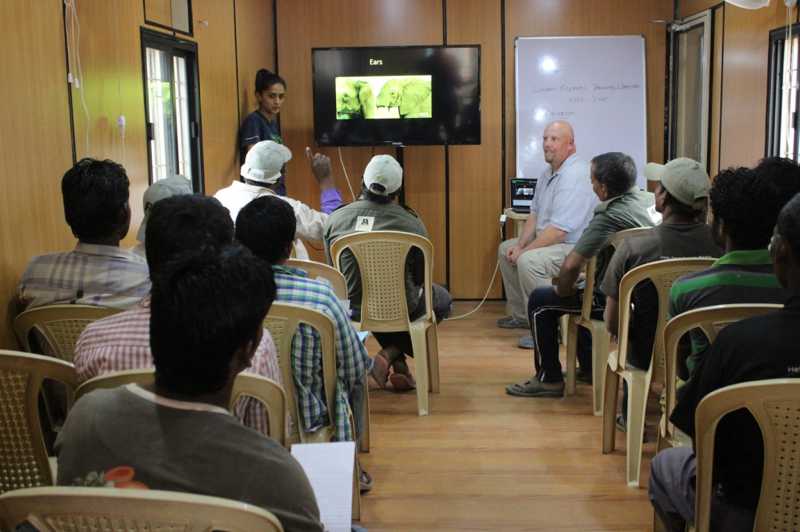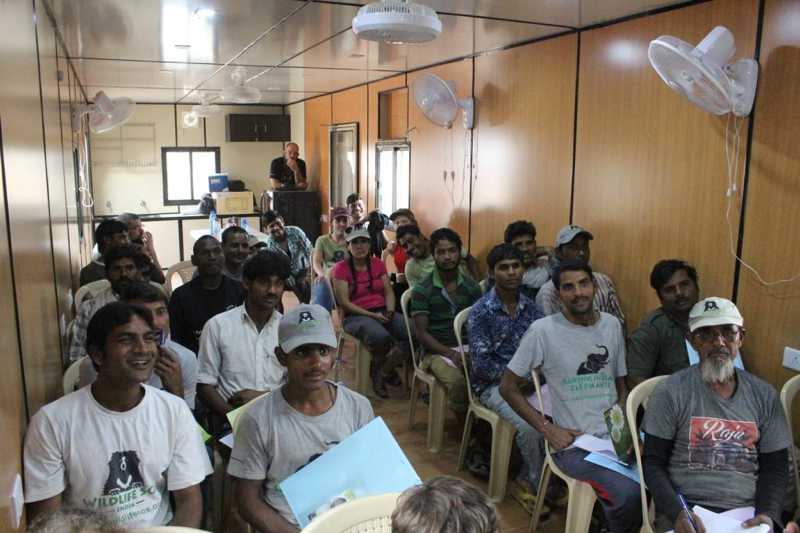At Wildlife SOS, the elephants that we rescue are generally in such dire conditions when they arrive at our centre, with bodies riddled with abscess wounds, overgrown nails and multiple injuries. Veterinary treatment is an essential part of their recovery, but can often be painful or stressful for the animals, as well as dangerous for the vets and keepers, especially when working with large bulls.
The introduction of Target Training into the daily routines of our wonderful pachyderms has changed all of this. Target Training involves teaching an elephant to respond to instructions in exchange for positive reinforcement in the form of treats and enthusiastic encouragement and praise from the keeper. When we first started target training our elephants, we didn’t know what to expect, but the results have been stupendous and the benefits, manifold. Not only has it made veterinary treatment significantly easier, safer and stress-free for the animals and doctors, with the elephants happily cooperating with the keepers in exchange for a yummy snack, target training has also helped build a stronger bond between the elephant and its keeper, and we find the elephants developing a heart-warming sense of trust and companionship with their keepers over time. Target Training is also aimed at keeping the elephants stimulated and active, helping reduce the psychological effects of the years of abuse they have endured.
Recently, Wildlife SOS enlisted the help of Eric Peterson, elephant keeper at Hogle Zoo, who introduced the protected contact and target training program at the zoo, to help keep their elephants healthy and stimulated, and make veterinary treatment and care significantly easier for their veterinarians. Eric flew down to India and travelled to the elephant Conservation and Care Centre, where he met twenty wonderful elephants and their mahouts or keepers, all ready to learn some tricks of the trade from an expert in the field.

“I’m not sure what to expect, really,” Eric tells us before leaving for the rescue centre “I know it isn’t going to be easy, but I’m definitely excited. These elephants are very different from the ones I’m used to working with back home, and I’m sure this is going to be as much a learning experience for me as it will be for the keepers and elephants at ECCC.”
Eric’s right. The language barrier is the first hardship he faces, and he finds the keepers aren’t all that enthusiastic about sitting in a makeshift classroom and listening to him struggle to communicate with them. To them, he’s an outsider, he doesn’t know their elephants like they do, and they’re not too keen on taking instructions from him. Eric, in turn, begins to feel like his is just a job to the mahouts, they don’t seem open to new ideas or changing their ways.
The night of December 1st 2015, Sita, one of the most recently rescued elephants collapsed. Years of stress on her legs had weakened them to a point where she couldn’t lift her massive frame up on her own. Terrified and struggling, crying out in pain, the fallen elephant causes chaos at the centre.
“It was scary, to say the least,” Eric tells us, “But that night I realised this wasn’t just a job to the keepers. Every single one of them was out there, in the middle of this cold night, comforting her and making sure help got there as soon as possible.”
A crane is arranged, and Sita is helped gently to her feet. She’s shaken up, but unhurt.
From then on, classes proceed with more positivity. Eric uses a bit of positive reinforcement on the keepers as well- handing out candy for a job well done and when the keepers ask questions. The lessons become more interactive and Eric gets a delightful glimpse into some of the folklore that is passed down through families that have worked with elephants for generations. He even picks up a little Hindi!
The progression of the program in turn helps legitimise Eric’s presence in the eyes of the staff. They’re visibly impressed as he gets even naughty little Peanut to offer up her trunk for a medical test, then to turn around on command for a handful of peanuts!

Eric leaves two weeks later full of memories, and full of praise for our keepers. “They’re a really hardworking group of people, and they learn fast when they put their minds to it.”
And the elephants?
“They’re amazing. They all have these unique personalities and it’s so much fun working with them and getting to know them. I was so impressed by how they learn- Rajesh, this full grown tusker in musth cooperates so beautifully during his check-ups.”
Eric can’t pick a favourite, although Laxmi certainly left an impression. “She’s like a marshmallow, a nice fluffy, friendly marshmallow,” Eric laughs.
He leaves us with a little friendly advice. “It’s important to understand their pasts,” he says, “But don’t dwell on it. The biggest part of their rehabilitation and recovery is giving them a chance to just live in the moment, to help them forget and start moving on.”




